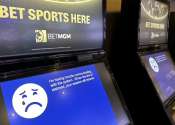How cyber scammers are trying to make AI tools pay
Proponents of artificial intelligence say its potential is limitless. But cyber scammers could also use it to their advantage.
Sep 12, 2023
0
7
Security

Proponents of artificial intelligence say its potential is limitless. But cyber scammers could also use it to their advantage.
Sep 12, 2023
0
7
Three major US banks have set aside an additional $23 billion as a backstop against bad loans, highlighting the brittle state of the US economy due to the coronavirus pandemic, the companies said Tuesday.
Jul 14, 2020
0
4
Internet

When a person is notified of a data breach involving their personal information, if they react with a feeling of fear—as opposed to anger—they're more likely to stop using the site.
Jun 22, 2023
0
8
Security

A persistent error message greeted Dulce Martinez on Monday as she tried to access her casino rewards account to book accommodations for an upcoming business trip.
Sep 16, 2023
0
9
Security

Much of the world has switched to embedded anti-counterfeit EMV (Europay, MasterCard, Visa) chips in credit cards, but adoption in the U.S. lags. Therefore, a significant percentage of the U.S. population is vulnerable to ...
Aug 4, 2020
0
5
Consumer & Gadgets

In simple terms, digital money can be defined as a form of currency that uses computer networks to make payments. Breathless media coverage of the future potential of cryptocurrencies such as Bitcoin has made digital money ...
Sep 15, 2022
1
7
Internet

Facebook on Tuesday said it is consolidating the system that handles payments at the social network and in its family of messaging apps.
Nov 12, 2019
0
10
Business

A bipartisan group of US senators has sent letters to major digital ad exchanges, including Google and Twitter, asking whether user data was sold to foreign entities who could use it for blackmail or other malicious ends.
Apr 3, 2021
0
5
Business

Today, there are more ways than ever to pay a bus fare. Instead of painstakingly counting their change into a farebox, transit riders can quickly tap their phone or swipe an auto-reloadable transit card.
Sep 30, 2022
0
6
Internet

I'm a victim of identity theft. Thieves stole my wallet out of my purse and were able to find out everything else they needed to steal my identity online. They exploited a system that the government, law enforcement and financial ...
Nov 2, 2022
0
12
A credit card is part of a system of payments named after the small plastic card issued to users of the system. It is a card entitling its holder to buy goods and services based on the holder's promise to pay for these goods and services. The issuer of the card grants a line of credit to the consumer (or the user) from which the user can borrow money for payment to a merchant or as a cash advance to the user.
A credit card is different from a charge card, where a charge card requires the balance to be paid in full each month. In contrast, credit cards allow the consumers to 'revolve' their balance, at the cost of having interest charged. Most credit cards are issued by local banks or credit unions, and are the shape and size specified by the ISO/IEC 7810 standard as ID-1.
This text uses material from Wikipedia, licensed under CC BY-SA